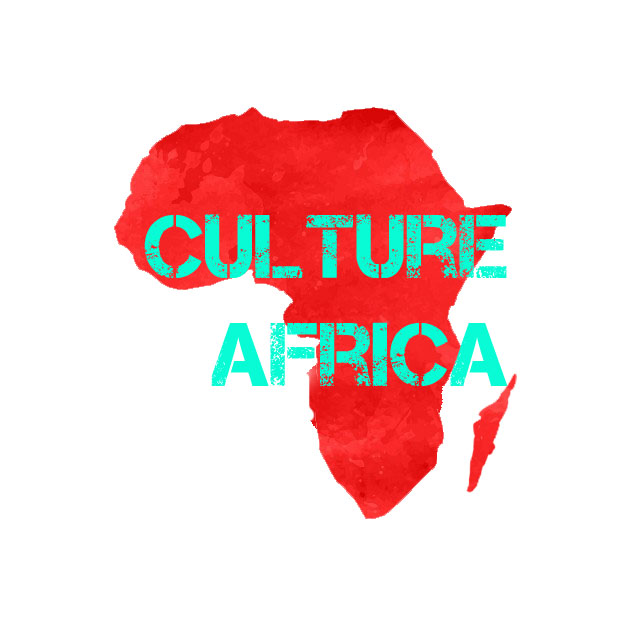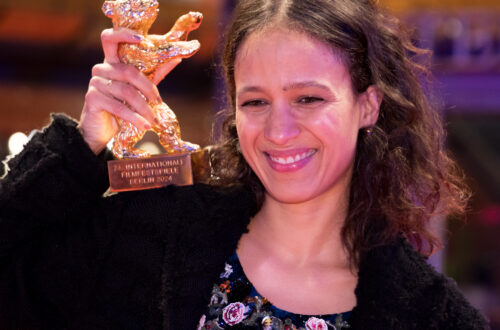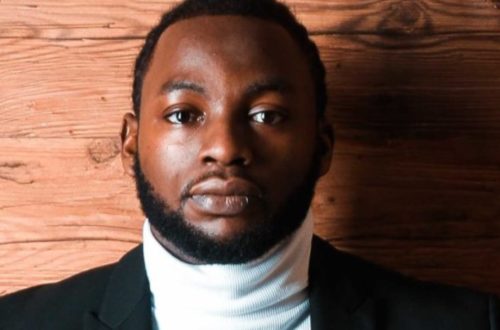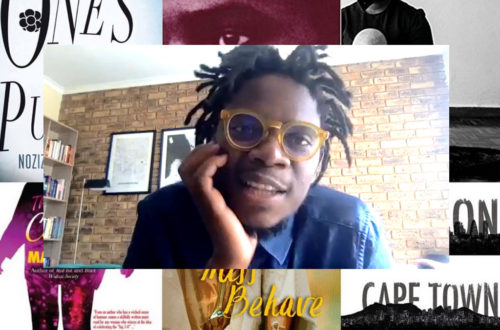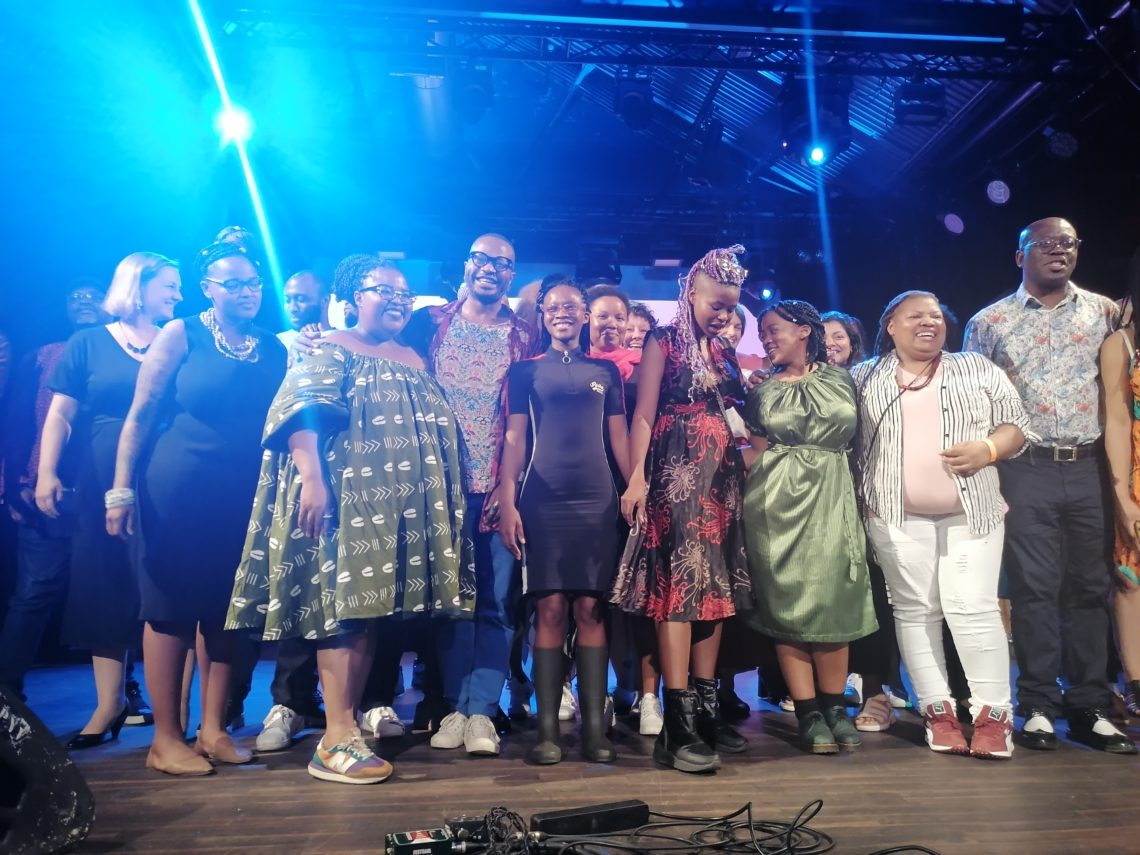
African Book Festival in Berlin 2022. A Report. engl/ger
Yesterday.Today.Tomorrow. That was the leitmotif of this year’s African Book Festival in Berlin. Finally without any restrictions, finally everything live and on the spot. The joy about this could be felt everywhere when you were out and about at the festival. Cultureafrica was media partner this year, but this should not distort the view when reporting about this event.
By Hans Hofele/cultureafrica.net
FÜR DEUTSCHE VERSION NACH UNTEN SCROLLEN
But: Where does one start to report? About a literary event that is more than the sum of its events? Even in retrospect, it was a very intense long weekend. If you count the launch of InterKontinental on Thursday evening, it was four days in which you could get involved with the authors and the whole diversity of African literature. And it was the encounters and conversations with the invited authors that gave you the feeling that you were not just a visitor and reporter, but part of a community. And that still gives you a tingling sensation.
Although the festival was excellently prepared, it was still on the brink of an abyss shortly before the opening: the Berlin building authority had withdrawn the permit for the Napoleon Complex venue just three days before the start. Stefanie Hirsbrunner and Karla Kutzner, the festival directors, Lidudumalingani, the curator, the 70 volunteers and the many supporters were horrified. Should all the work of a year have been in vain? The solidarity of the Berlin cultural scene made it possible to find a replacement within a few hours. Thus, the venue Alte Münze, south of Alexanderplatz, came to enjoy the African Book Festival. One after the other.
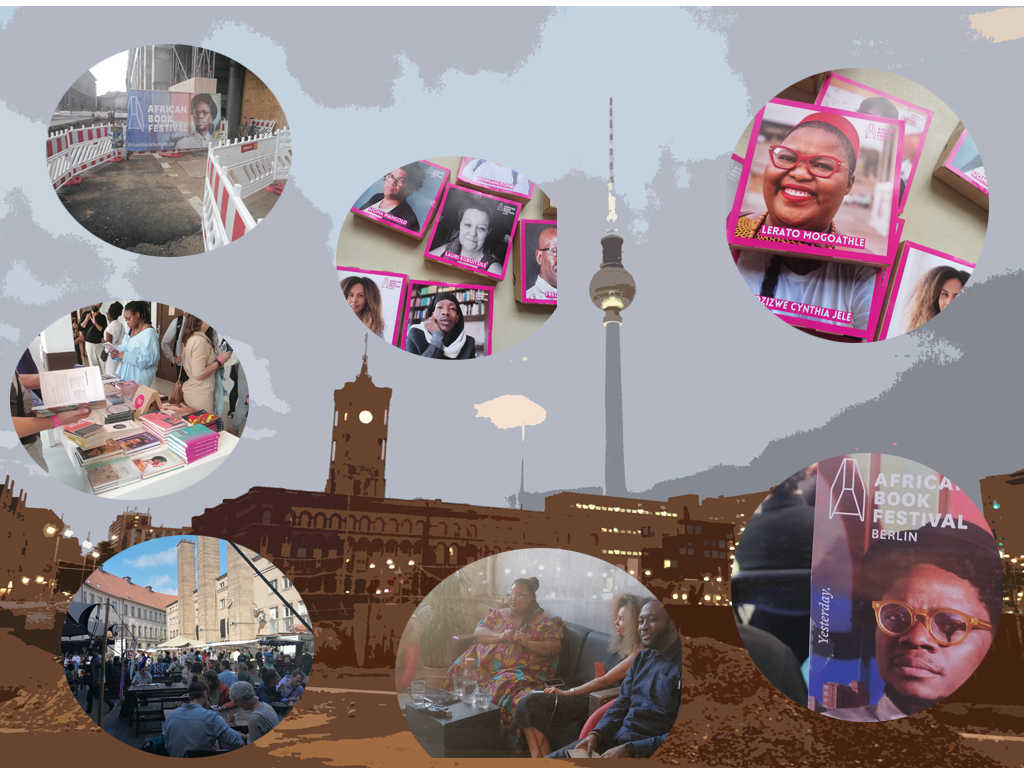
Prologue
Since many of the ABF’s authors also attended the publishing launch of Interkontinental Verlag in the courtyard of the Student Hotel near Jannowitzbrücke, eastern Berlin, I’ll start there. On this muggy evening, one day before the opening of the actual festival, many African authors, publishers, press and guests gathered there.
The keynote speech by Ainehi Edoro-Glines, founder and director of the influential literary platform brittle paper, gave an interesting insight into the market mechanisms of the book market and the African perspectives there. It was at the same time an indication of subsequent events with brittle paper at the ABF to follow.
There are overlaps between the authors of the four books of the new InterKontinental Publishing House and the ABF. It would have been strange if they had only flown in for the publisher’s launch. So on Thursday one could already enjoy readings of the German translations of Igoni Barretts’ Blackass, Lauri Kubuitsiles’ Zerstreuung/Scattered, Jennifer Makumbis’ Die erste Frau/The First Woman and the essay collection Could this be Love, edited by Stefanie Hirsbrunner.
When all the authors then march across Alexanderplatz late at night for a round of kebabs, the fun is guaranteed. It was very amusing to walk with this colorful group across the nightly Alex and to sit in front of Ali Baba’s 24h booth. Socializing is an important part of every literature festival.
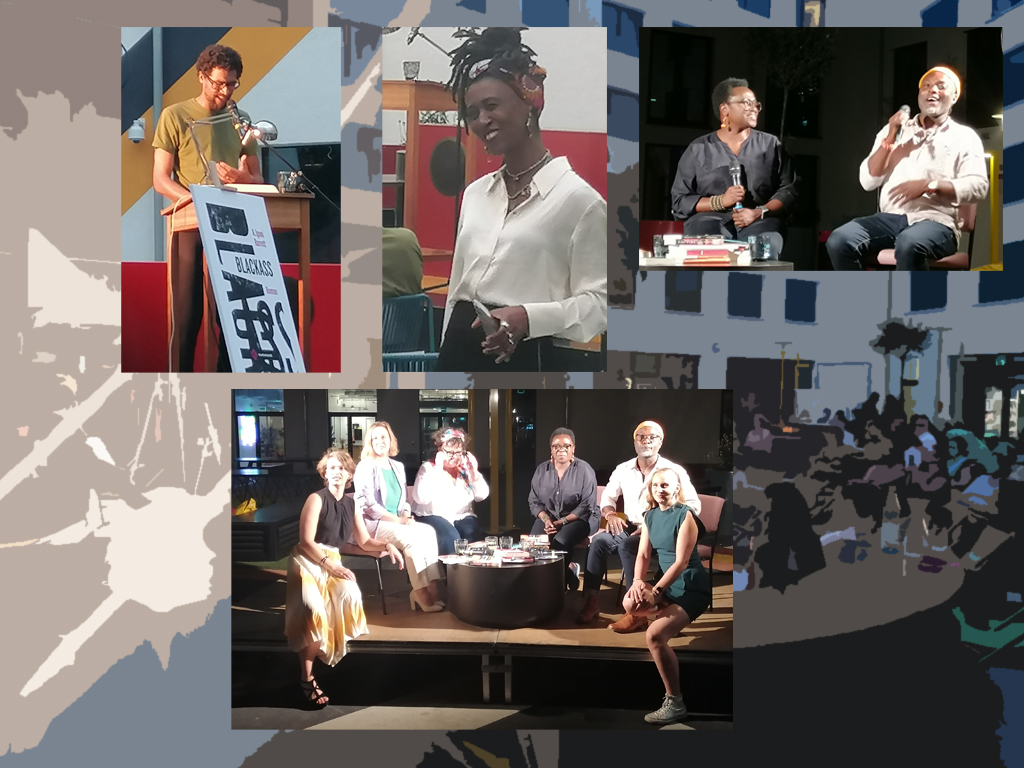
Opening
The rain was pelting down when the ABF was festively opened on Friday evening in the Festsaal Kreuzberg. The diplomatic limousine in front of the door nourished the hope that Claudia Roth, Minister of State for Culture and the Arts and patron of the festival, would come in person after all. But it was the car of the South African ambassador Stone Sizani. There was a reason for this, as the focus this year was on the country on the Cape. Alexandra Antwi-Boasiako led through the evening with verve. The ambassador won over the audience with a short, witty speech. He pronounced the difficult names of the numerous South African guests with relish and perfection, earning cheers in return. Claudia Roth had previously addressed the audience in a video message.
You can see parts of the Opening under this Link. Literaturhaus Berlin has covered it:
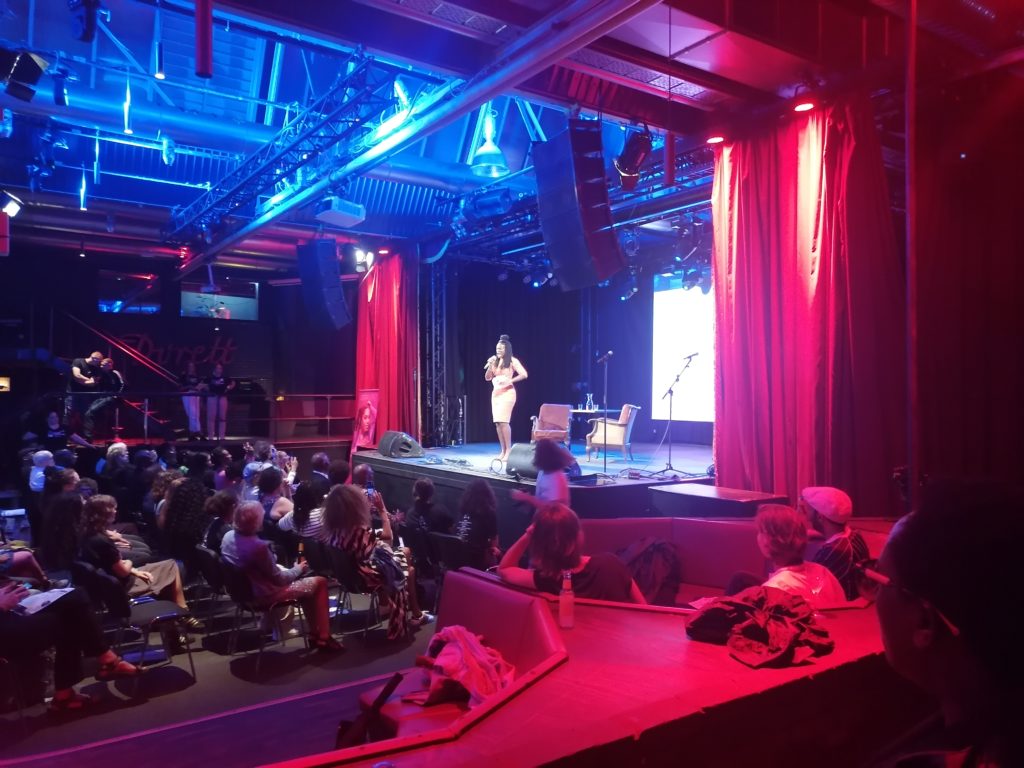
A star of this year’s Book Festival was Margaret Busby, who became a legend through her anthologies Daughters of Africa and New Daughters of Africa. But also legendary was her speech on the opening night, in which she factually presented the development of African literature and its reception. No one held it against her. The mood was exuberant. Curator Lidudumalingani also took the floor and was full of thanks and anticipation for the festival. He echoed his own leitmotif, “No author writes for himself alone,” in his speech. While lively conversation groups were already forming outside the door of the festival hall, inside they were waiting for the highlight of the evening: The join-in comedy “Tell me nothing from the Horse” by actresses Thelma Buabeng and Celina Bostic had the hall laughing. Good live acts are now a tried and true part of the African Book Festival and help break up the occasional heaviness of literary festivals.

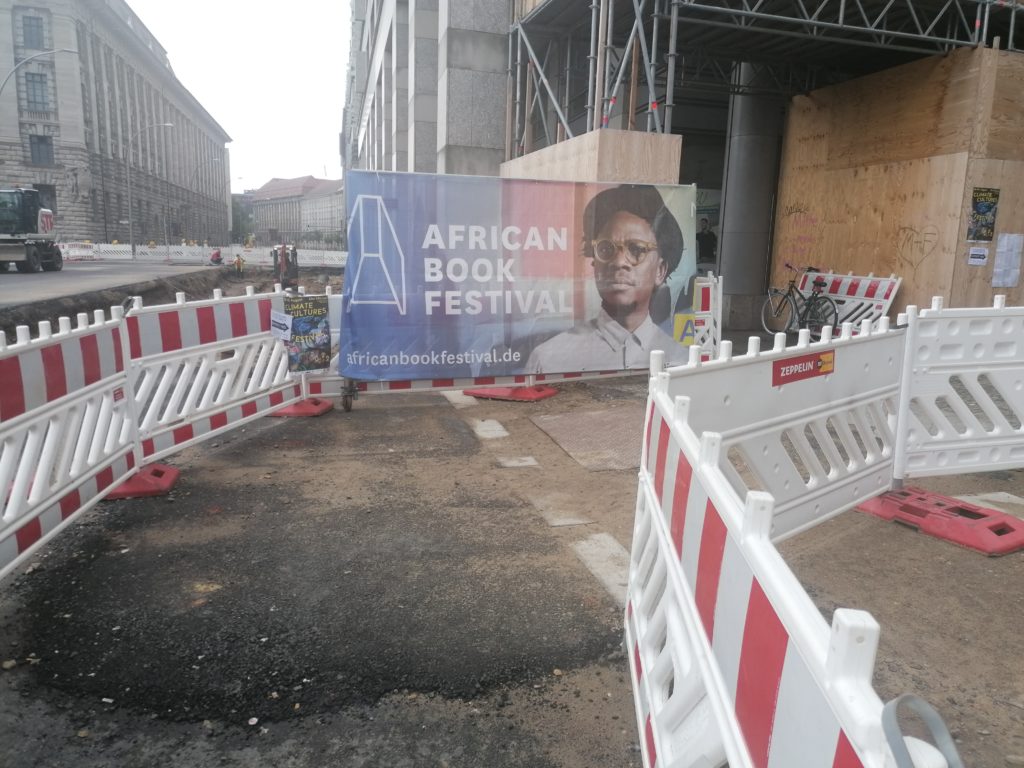
Saturday
Its hard to get there! But then: Already on Saturday, the first day of the regular festival, it will be difficult to follow the abundance of the offer. The panel “White Lies” about the genre of historical fiction, which always gives rise to reinterpretation of history and prioritization of the POV of African author:s, kicked off the day. There was some lighthearted debate. Included:
Lauri Kubuitsile (Dispersion), Fred Khumalo (The Longest March) & Mphuthumi Ntabeni (The Wanderers). As Chair: Bhakti Shringarpure (Radical Books Collective).
Venice Trommer presented Igoni Barrett’s Blackass, which is now also available in (Venice Trommer’s) German translation. Already the events are crossing paths: I go to the whimsical panel “Man in the Mirror,” while next door Margaret Busby presents her project New Daughters of Africa.
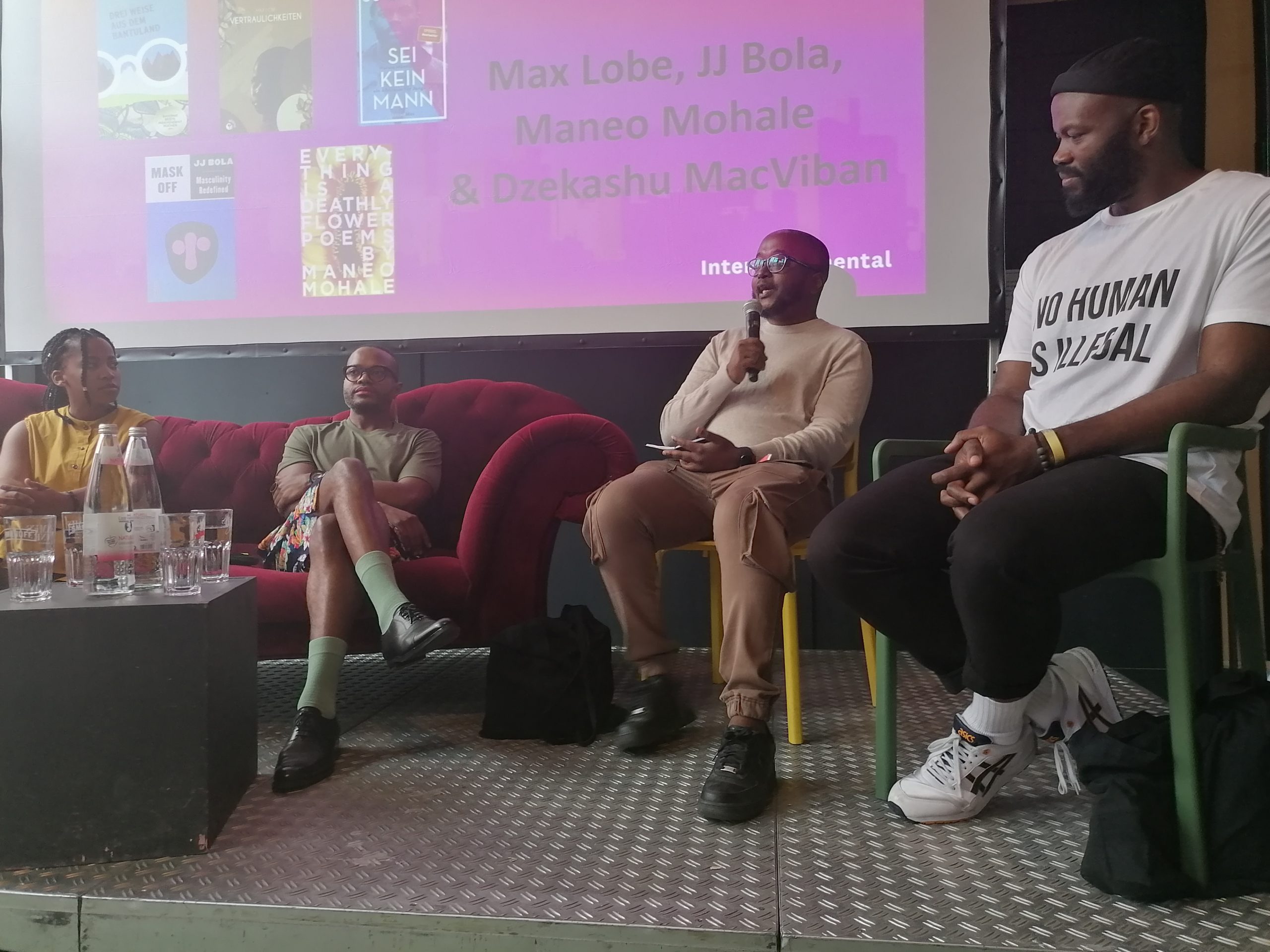
The question of gender, the understanding of roles and all their twists and turns are the focus of the “Mirror” panel. Splendidly cast and well acted: Max Lobe (Confidences, A long way from Douala), JJ Bola (The Selfless Act of Breathing, Masculinity Redifined) of poet Maneo Mohale (Everything is a Deathly Flower). Led by Dzekashu MacViban (Scions of the Malcon-tent). Max Lobe told impressively about his understanding of masculinity and being gay and how the differences between the continents of this self-understanding look like in dangerous or amusing everyday aspects.
I loved the diversity of the conversations. I also loved the venue. Personal attending matters. Joining panels and discussions matters. Lauri Kubuitsile
JJ Bola gave an amused account of his youth in Kinshasa, where dancing is part of the male self-understanding, while in the Black community in London (JJ Bola’s second home) it is considered “feminine”. Maneo Mohale and Max Lobe interacted so beautifully that it was hard to imagine what it was like when Zoom dominated the events or didn’t even take place.
The Book Specials on this day were characterized by Igoni Barrett’s Blackass, Margaret Busbys’ New Daughter Anthologies, Ijoma Mangolds’ The German Crocodile or Paradise in Gaza by Niq Mhlongo. The special on Tanz der Teufel/Danse de Villains by Fiston Mwanza Mujila was another highlight. Of course, this is also due to the fact that Fiston gives an unbelievable performance as soon as he reads aloud himself. The visitors could experience this in different forms on all days. Also in the Poetry Night on the second day.
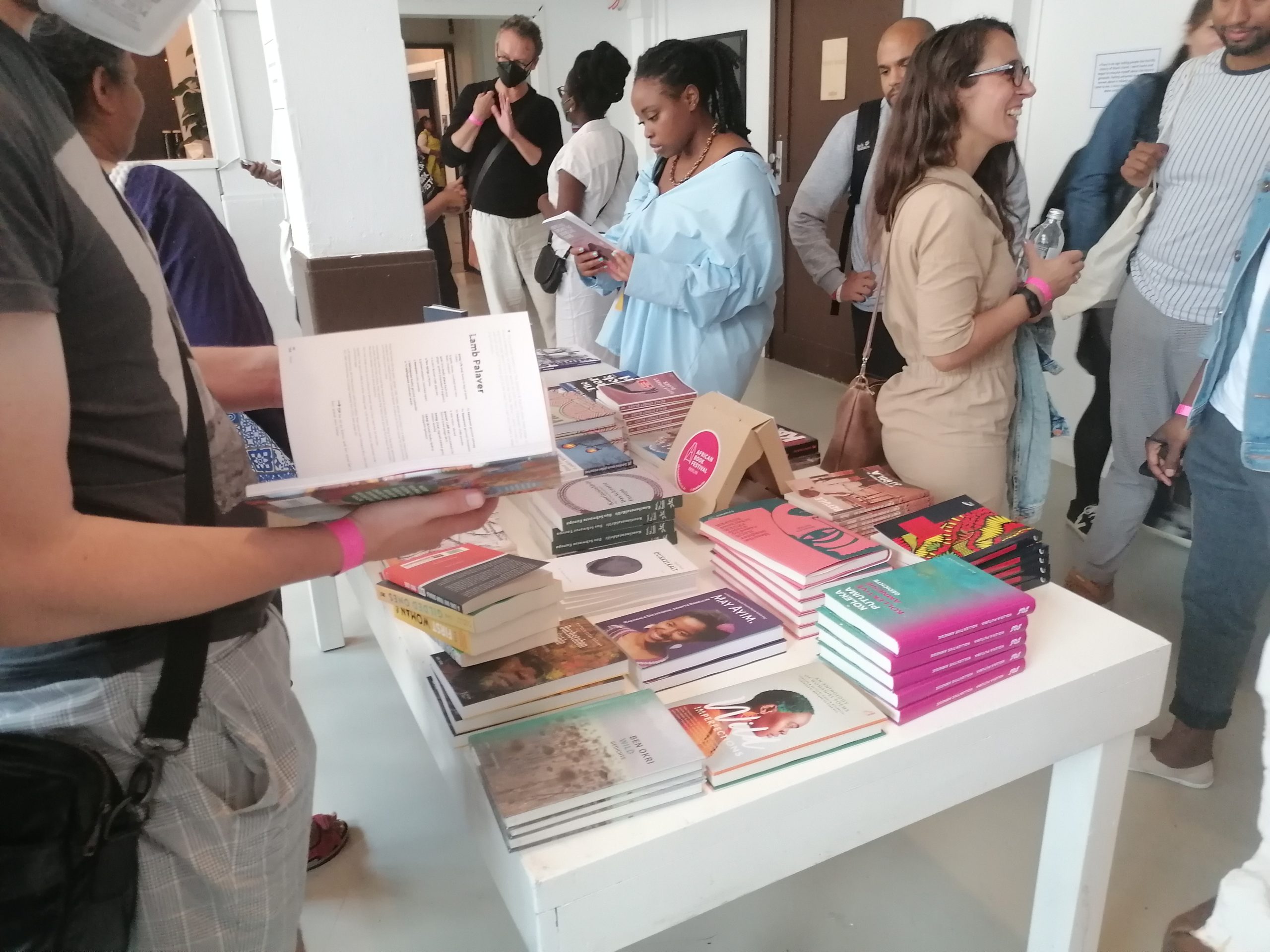
Niq Mhlongo, like Igoni Barrett, was part of an exciting round table on the topic of short stories.
Very European, very German, and at the same time “Black and White” were the two Book Specials Could This Be Love/Kann das denn Liebe sein, a volume of essays, edited by Stefanie Hirsbrunner, on the problem of interracial relationships. Told from many (predominantly female) perspectives.
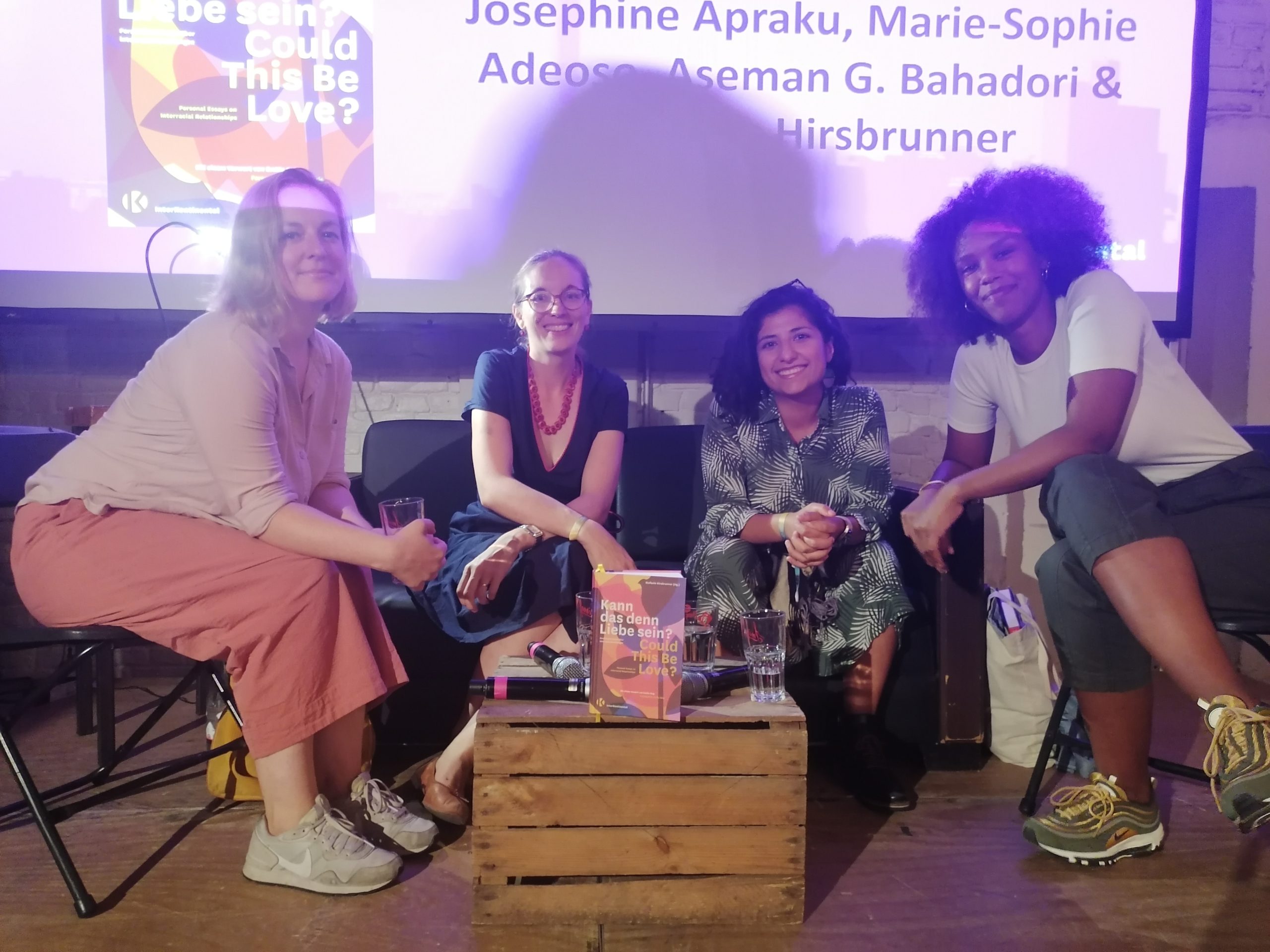
This was exciting. Some of the authors talked about how much they had to overcome to talk about very personal things like relationships, racism, identity and the tension within a relationship. It was also packed at the book launch, the German translation of Jennifer Nansubuga Makumbi’s wonderful Uganda novel The First Woman. (see also the interview with Jennifer on this page).
Jennifer N. Makumbi sprays so much fine humor when questions like the one about feminism of the African kind come up. She and almost all the invited authors are very entertaining. This goes down very well with the audience.
Outside, in the courtyard of the Alte Münze, the many conversations simply continued. There was still the performative reading of Olivia Wenzel (1000 Serpentines Fear). So right out of everyday life! Long lines were already forming at the entrance, because another highlight was still to come: the poetic music artist Bongeziwe Mabandla from South Africa. Now the Alte Münze (Old Mint) was really the epicenter of Africa in Berlin this Saturday!
„I see it as a readers festival. As a writer I see: there is a place in the world for our stories. So powerful. I cant wait to come back to Berlin“ Lerato Mogoathle
Sunday
Sunday started with a fine discussion on Mental Health Issues and their literary treatment. JJ Bola, Lidudumalingani & Goitseone Montsho were the guests, Tinashe Mushakavanhu moderated.
Already really full again was the event on African Markets, chaired by Ainehi Edoro-Glines of brittle paper. Writing books is one art, bringing them successfully to the book market is another. Margaret Busby, Jennifer N. Makumbi, Niq Mhlongo and Hans Balmes (S.Fischer Publishers) were the knowledgeable and entertaining guests. Unbelievable stories of rejected manuscripts, clueless publishing people, the sometimes inscrutable publishing structures and the strategies against them, amazed the visitors.

Lauri Kubuitsile then had another impressive event on her book, Dispersion/The Scattering. Keith Black moderated the event on the oppressive and in Germany highly topical subject of the genocide of the Herero and Nama, which the author tells in a very moving story. More? Online Magazines, Lost in Translations,…where to go?
Skipping Borders, for example. Emmanuel Iduma (A Strangers’s Pose), Yara Nakahanda Monteiro (Loose Ties) & Lerato Mogoathle (Vagabonds) under the direction of Emeka Okereke, told about their experiences as Africans traveling through Africa, which they processed in books. Very exciting, since in the West we are mainly influenced by the travel literature of white Europeans and Americans.

Sunday is also Kids and Family Day at the ABF. Writing for Children was a round table. It was about the important topics like language, representation, marketing, speech and responsibility. But there was also reading with the kids. Outside on the African Gems Stage: Girl without a Sound by Buhle Ngaba or Schwarzkäppchen (Little Black Cappy) by Anna Samwel Manyanza were the attractions.
Not everything can be mentioned. The entertaining conclusion of the ABF by the Poetry Night can. Here the African Gem shone particularly brightly again. The combination of literature and performance makes a literary festival an experience: Xabiso Vili, Athambile Masola, Keith Black, Fiston Mwanza Mujila, Goitseone Montsho, Maneo Mohale. A spraying rain of vocal art, music and sounds.

At the end of the festival, the visitors and authors are drunk with the magic of their own African literature festival in Berlin. And as soon as you leave, you miss all the people and wonderful moments that such a festival brings you. It was Today. Now it’s Yesterday, we’re looking forward to Tomorrow. The richness of a focus country, which this year was South Africa, could only be touched upon. Curator Lidudumalingani did a good job. Because it was hard to find the right ones for the festival out of the many great writers of the country. In the meantime, the number of publications in this country is almost unmanageable. But it is a good sign that much cannot be covered by a weekend festival. It has only just begun to really perceive the richness of African literature(s) in Germany.
Another video of Literaturhaus Berlin comes here:
DEUTSCHE VERSION
African Book Festival Berlin 2022
Yesterday.Today.Tomorrow. Das war das Leitmotiv des diesjährigen African Book Festivals in Berlin. Endlich wieder ganz ohne Beschränkungen, endlich alles live und vor Ort. Die Freude darüber konnte man überall spüren, wenn man auf dem Festival unterwegs war. Cultureafrica war dieses Jahr Medienpartner, dies soll den Blick aber nicht verstellen, wenn über dieses Event berichtet wird.
Doch: Wo fängt man an zu berichten? Über ein Literaturevent, das mehr ist als die Summe ihrer Veranstaltungen? Es war auch im Nachhinein ein sehr intensives langes Wochenende. Zählt man den Verlagslaunch von InterKontinental am Donnerstag Abend dazu, waren es vier Tage, an denen man sich mit den Autor:innen einlassen konnte, auf die ganze Vielfalt der afrikanischen Literatur. Und es waren gerade die Begegnungen und Gesprächen mit den eingeladenen Autor:innen, die einem das Gefühl vermitteln konnten, man sei nicht nur Besucher und Berichterstatter sondern Teil einer Gemeinschaft. Und das versetzt einem auch jetzt noch ein Kribbeln.
Dabei stand das Festival, obwohl exzellent vorbereitet, noch kurz vor der Eröffnung an einem Abgrund: Das Berliner Bauamt hatte knapp drei Tage vor Beginn, dem Veranstaltungsort Napoleon Komplex die Genehmigung entzogen. Bei Stefanie Hirsbrunner und Karla Kutzner, den Leiterinnen des Festivals, bei Lidudumalingani, dem Kurator, den 70 Volunteers und den vielen Unterstützer:innen machte sich Entsetzen breit. Sollte die ganze Arbeit eines Jahres umsonst gewesen sein? Die Solidarität der Berliner Kulturszene machte es möglich, dass innerhalb weniger Stunden Ersatz gefunden werden konnte. So kam der Veranstaltungsort Alte Münze südlich des Alexanderplatzes zum Genuss des African Book Festivals. Der Reihe nach.

Prolog
Da viele der Autor:innen des ABF auch am Verlagslaunch des Interkontinental Verlags im Innenhof des Student Hotels an der Jannowitzbrücke teilnahmen, beginne ich dort. An diesem schwülwarmen Abend, einen Tag vor Eröffnung des eigentlichen Festivals, gaben sich dort viele afrikanische Autor:innen, Verlagsleute, Presse und Gäste ein Stelldichein.
Die Keynote von Dr. Ainehi Edoro, Gründerin und Leiterin der einflussreichen Literaturplattform brittle paper, gab einen interessanten Einblick die Marktmechanismen des Buchmarkts und den afrikanischen Perspektiven dort. Es war gleichzeitig ein Hinweis auf folgende Veranstaltungen mit brittle paper auf dem ABF, die dann folgen sollten.
Es gibt Überscheidungen zwischen den Autor:innen der vier Bücher des neuen Interkontinental Verlags und dem ABF. Wäre ja auch seltsam gewesen, wenn nur für den Verlagslaunch eingeflogen worden wäre. So kam man schon am Donnerstag in den Genuss von Lesungen der deutschen Übersetzungen von Igoni Barretts‘ Blackass, Lauri Kubuitsiles‘ Zerstreuung, Jennifer Makumbis‘ Die erste Frau und der Essayband Could this be Love, herausgegeben von Stefanie Hirsbrunner.
Wenn dann alle Autor:innen zu später Stunde über den Alexanderplatz zu einer nächtlichen Dönerrunde marschieren, ist der Spaß garantiert. Es war sehr amüsant, mit dieser bunten Truppe, über den nächtlichen Alex zu laufen und vor Ali Babas 24h Bude zu sitzen. Das Socializing ist ja ein wichtiger Part eines jeden Literaturfestes.

Eröffnung
Der Regen prasselte, als am Freitag Abend im Festsaal Kreuzberg das ABF festlich eröffnet wurde. Die Diplomaten-Karosse vor der Tür nährte die Hoffnung, dass Kulturstaatsministerin Claudia Roth, die Schirmherrin des Festivals, doch auch persönlich kommen wollte. Es war aber der Wagen des südafrikanischen Botschafters Stone Sizani. Das hatte seinen Grund, war doch der Schwerpunkt dieses Jahr auf das Land am Kap gerichtet. Alexandra Antwi-Boasiako führte mit Verve durch den Abend. Mit einer kurzen, launigen Rede konnte der Botschafter das Publikum gewinnen. Genüsslich und perfekt sprach er die schwierigen Namen der zahlreichen südafrikanischen Gäste aus und erntete dafür Jubel. Claudia Roth wandte sich zuvor in einer Videobotschaft ans Publikum.

Ein Star des diesjährigen Book Festivals war Margaret Busby, die durch ihre Anthologien Daughters of Africa und New Daughters of Africa zur Legende wurde. Legendär lang war aber auch ihre Rede am Eröffnungsabend, in der sie faktenreich die Entwicklung der afrikanischen Literatur und ihre Rezeption vortrug. Es nahm ihr niemand übel. Die Stimmung war ausgelassen. Auch Kurator Lidudumalingani ergriff das Wort und war voller Dank und Vorfreude auf das Festival. Sein eigenes Leitmotiv „Kein Autor schreibt für sich allein“ griff er auch in seiner Rede wieder auf. Während sich vor der Tür des Festsaals schon angeregte Gesprächsgruppen bildeten, wurde Innen auf das Highlight des Abends gewartet: Die Mitmach Comedy„Tell me nothing from the Horse“ der Schauspielerinnen Thelma Buabeng und Celina Bostic brachte den Saal zum Lachen. Gute Live Acts sind mittlerweile erprobter Teil des African Book Festivals und helfen, die gelegentliche Schwere von Literaturfestivals aufzubrechen.
Samstag
Schon am Samstag, dem ersten Tag des regulären Festivals, wird es schwierig, der Fülle des Angebots zu folgen. Den Auftakt macht das Panel „White Lies“ über das Genre des Historical Fiction, das immer wieder Anlass für Neu Interpretation der Geschichte und Priorisierung des POV afrikanischer Autor:innen bietet. Es wurde fröhlich debattiert. Mit dabei: Lauri Kubuitsile (Zerstreuung), Fred Khumalo (The Longest March) & Mphuthumi Ntabeni (The Wanderers). Als Chair: Bhakti Shringarpure (Radical Books Collective).
Venice Trommer stellte Igoni Barrett’s Blackass vor, das nun auch in (Venice Trommers) deutscher Übersetzung vorliegt. Schon kreuzen sich die Veranstaltungen: Ich gehe zum launigen Panel „Man in the Mirror“, während nebenan Margaret Busby ihr Projekt New Daughters of Africa vorstellt.

Die Geschlechterfrage, das Rollenverständnis und all ihre Windungen stehen im Mittelpunkt des „Mirror“ Panels. Großartig besetzt und bestens aufgelegt: Max Lobe (Confidences, A long way from Douala), JJ Bola (The Selfless Act of Breathing, Masculinity Redifined) der Lyrikerin Maneo Mohale (Everything is a Deathly Flower). Geleitet von Dzekashu MacViban (Scions of the Malcontent). Max Lobe erzählte eindrücklich über sein Verständnis von Männlichkeit und Gay sein und wie die Unterschiede zwischen den Kontinenten dieses Selbstverständnis in gefährlichen oder amüsanten Alltagsaspekten aussehen.
JJ Bola berichtete amüsiert über seine Jugend in Kinshasa, wo Tanzen zum männlichen Selbstverständnis gehört, während es in der Black Community in London (JJ Bolas zweiter Heimat) als „weiblich“ gilt. Maneo Mohale und Max Lobe interagiert so wunderbar, dass man sich kaum vorstellen mochte, wie es war, als Zoom die Veranstaltungen prägte oder gar nicht erst stattfand.
Die Book Specials an diesem Tag waren geprägt von Igoni Barretts’ Blackass, Margaret Busbys‘ New Daughter Anthologies, Ijoma Mangolds‘ The German Crocodile oder Paradise in Gaza von Niq Mhlongo. Das Special zu Tanz der Teufel/Danse de Villains von Fiston Mwanza Mujila war ein weiters Highlight. Das liegt natürlich auch etwas daran, dass Fiston, sobald er selber vorliest, eine unglaubliche Performance abgibt. Das konnten die Besucher:innen an allen Tagen in unterschiedlichen Formen, erleben. Auch in der Poetry Night am zweiten Tag.
Niq Mhlongo war wie Igoni Barrett parallel Teil eines spannenden Round Table zum Thema Short Stories.

Ganz europäisch, ganz deutsch und gleichzeitig „Black and White“ ging es in den beiden Book Specials Could This Be Love/Kann das denn Liebe sein“, einem Essayband, herausgegeben von Stefanie Hirsbrunner, zur Problematik der Interracial Relationships. Erzählt aus vielen (überwiegend weiblichen) Perspektiven.
Das war spannend. Einige Autorinnen erzählten von der großen Überwindung, die es sie gekostet hat, über sehr persönliche Dinge wie Beziehung, Racism, Identität und der Spannung innerhalb einer Beziehung, zu sprechen. Packe voll war es auch bei der Buchvorstellung, der deutschen Übersetzung von Jennifer Nansubuga Makumbis wunderbaren Uganda Roman The First Woman/Die Erste Frau. (siehe auch das Interview mit Jennifer auf dieser Seite)
Jennifer N. Makumbi versprüht dabei so viel feinen Humor, wenn Fragen, wie die nach dem Feminismus afrikanischer Art kommen. Wie sie überhaupt und fast alle eingeladenen Autor:innen sehr unterhaltsam sind. Das kommt beim Publikum sehr gut an.
Draußen, im Hof der Alten Münze, gingen die vielen Gespräche einfach weiter. Es gab noch die performative Lesung von Olivia Wenzel (1000 Serpentinen Angst). So richtig aus dem Alltag! Es bildeten sich am Eingang bereits lange Schlangen, denn ein weiteres Highlight kam noch: der poetische Musikkünstler Bongeziwe Mabandla aus Südafrika. Nun war die Alte Münze wirklich das Epizentrum Afrikas in Berlin an diesem Samstag!
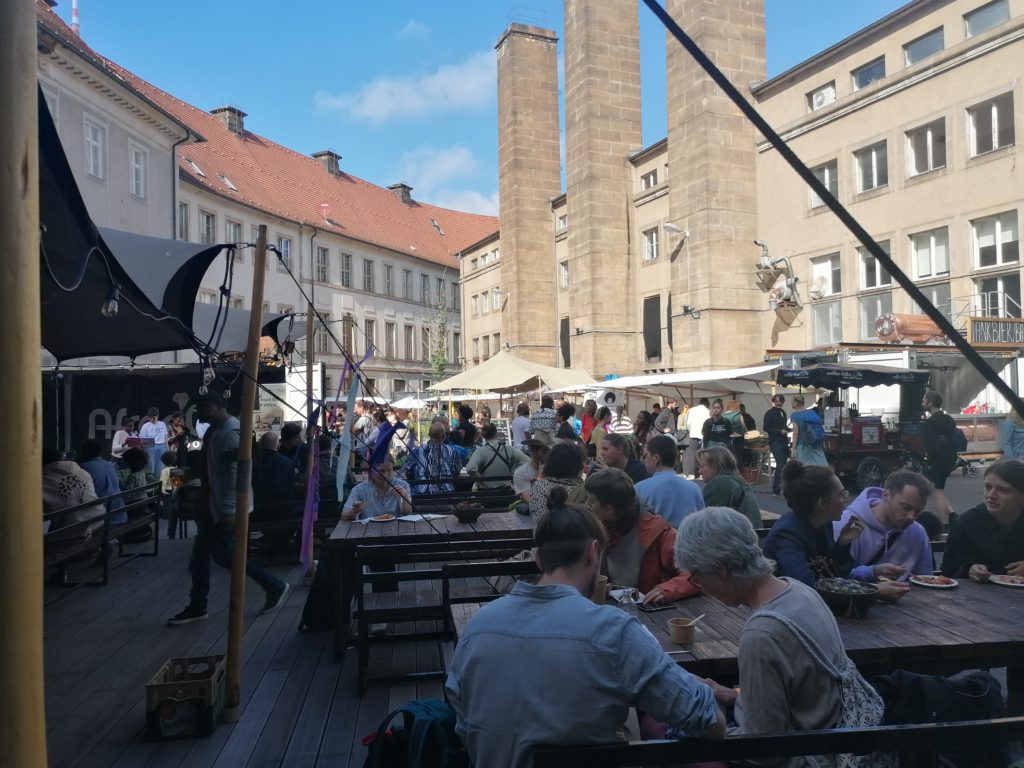
Sonntag
Der Sonntag startete mit einer feinen Diskussion über Mental Health Issues und ihrer literarischen Verarbeitung. JJ Bola, Lidudumalingani & Goitseone Montsho waren die Gäste, Tinashe Mushakavanhu moderierte.
Schon wieder richtig voll war die Veranstaltung zu African Markets, die Ainehi Edoro-Glines von brittle paper leitete. Bücher schreiben ist eine Kunst, sie erfolgreich in den Buchmarkt zu bringen, eine andere. Margaret Busby, Jennifer N. Makumbi, Niq Mhlongo und Hans Balmes (S.Fischer Verlage) waren die kompetenten und kurzweiligen Gäste. Unfassbare Stories von abgelehnten Manuskripten, ahnungslosen Verlagsleuten, den teils undurchschaubaren Verlagsstrukturen und die Strategien dagegen, brachten die Besucher:innen zum Staunen.
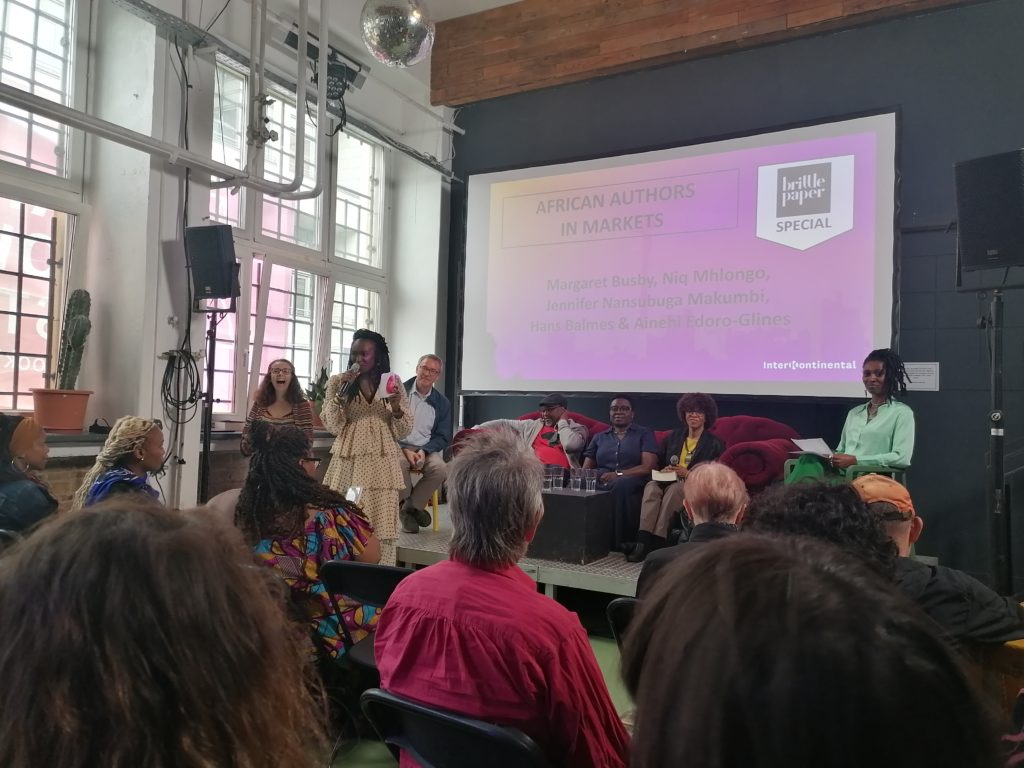
Lauri Kubuitsile hatte dann noch eine beeindruckende Veranstaltung zu ihrem Buch Zerstreuung/The Scattering. Keith Black moderierte die Veranstaltung zum beklemmenden und in Deutschland hochaktuellen Thema Völkermord an den Herero und Nama, das die Autorin in einer sehr bewegenden Geschichte erzählt. Mehr? Online Magazines, Lost in Translations,…where to go?
Skipping Borders zum Beispiel. Emmanuel Iduma (A Strangers’s Pose), Yara Nakahanda Monteiro (Loose Ties) & Lerato Mogoathle (Vagabonds) unter der Leitung von Emeka Okereke, erzählten von ihren Erlebnissen, die sie als Afrikaner:innen auf Reisen durch Afrika erlebten und in Büchern verarbeiteten. Sehr spannend, ist man doch im Westen vor allem durch die Reiseliteratur weißer Europäer und Amerikaner geprägt.
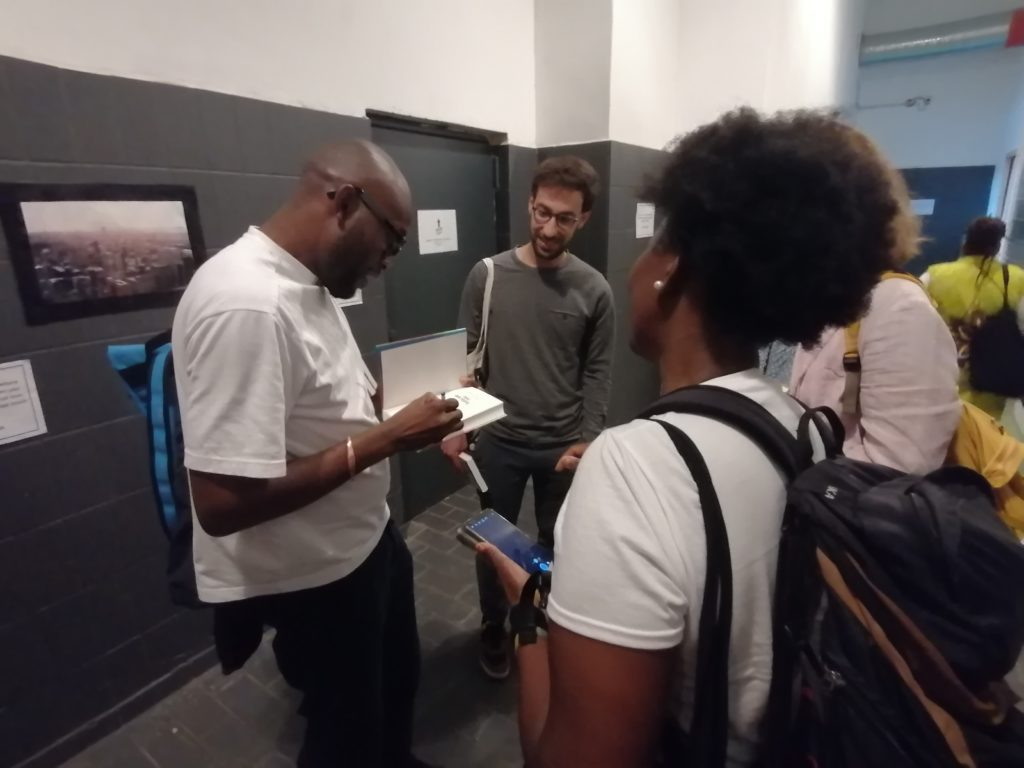
Sonntag ist auch Kids und Family Day auf dem ABF. Writing for Children war ein Round Table. Es ging um die wichtigen Themen wie Sprache, Repäsentation, Marketing, Sprache und Verantwortung. Doch mit den Kids wurde auch gelesen. Draußen auf der African Gems Stage: Girl without a Sound von Buhle Ngaba oder Schwarzkäppchen (Little Black Cappy) von Anna Samwel Manyanza waren die Attraktionen.
„Ein professionell kuratiertes Literaturfestival wie das ABF ist definitiv ein Gewinn. Auch das ganze Setting: Es gibt Essen, Trinken, Autor:innen tauschen sich aus, der Eine gibt dem der Anderen ein Buch mit. Das zeigt, wie wichtig der persönliche Austausch ist.“ Jona Krützfeld / akono publishing
Nicht alles kann erwähnt werden. Der unterhaltsame Abschluss des ABF durch die Poetry Night schon. Hier leuchtete der African Gem wieder besonders hell. Die Verbindung von Literatur und Performance macht ein Literaturfestival zum Erlebnis: Xabiso Vili, Athambile Masola, Keith Black, Fiston Mwanza Mujila, Goitseone Montsho, Maneo Mohale. Ein sprühender Regen von Vokalkunst, Musik und Sounds.
Am Ende des Festivals sind die Besucher:innen und Autor:innen betrunken vom Zauber eines eigenen afrikanischen Literaturfestivals in Berlin. Und kaum hat man es verlassen, vermisst man all die Menschen und wunderbaren Momente, die einem ein solches Festival beschert. Es war Today. Jetzt ist es Yesterday, wir freuen uns auf Tomorrow. Der Reichtum eines Schwerpunktlandes, das dieses Jahr Südafrika war, konnte dabei nur gestreift werden. Kurator Lidudumalingani machte einen guten Job. Denn es war schwer, aus den vielen tollen Schriftsteller:innen des Landes die passenden für das Festival zu finden. Mittlerweile wird auch in diesem Land eine fast unüberschaubare Zahl an Publikationen erreicht. Aber es ist ein gutes Zeichen, dass vieles nicht von einem Wochenendfestival abgedeckt werden kann. Es hat gerade erst richtig begonnen, den Reichtum der afrikanischen Literatur(en) in Deutschland richtig wahr zu nehmen.
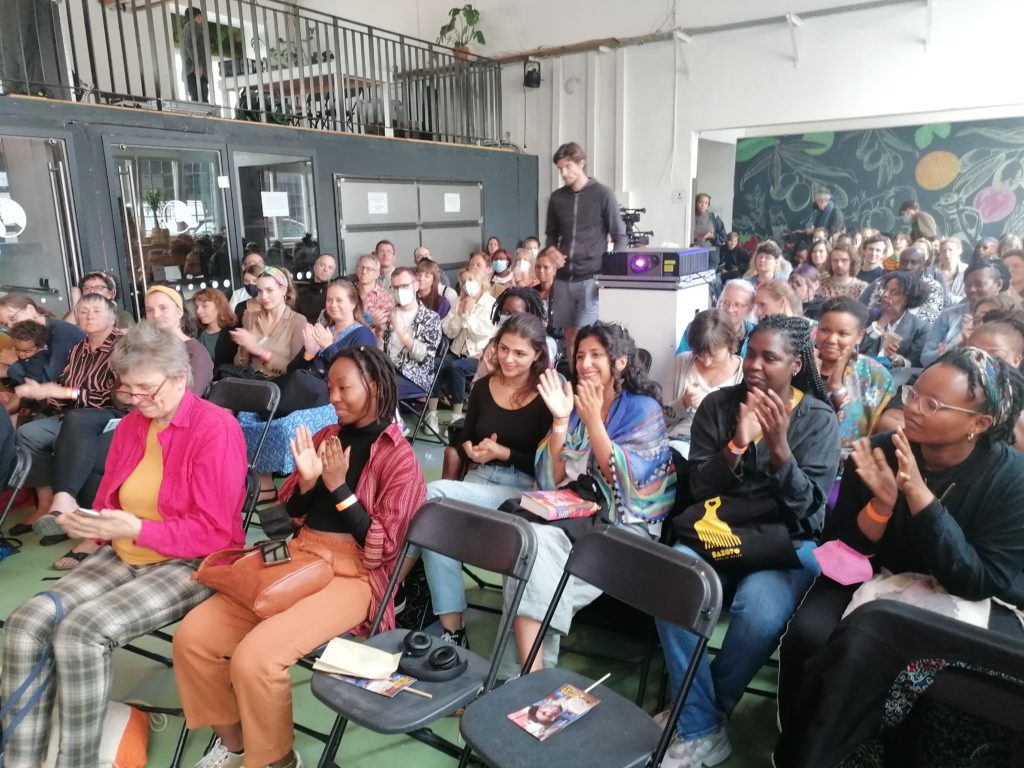
copyright: cultureafrica.net 2022


